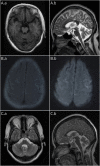Neurological Autoimmunity Associated With Homer-3 Antibody: A Case Series From China
- PMID: 34580182
- PMCID: PMC8477375
- DOI: 10.1212/NXI.0000000000001077
Neurological Autoimmunity Associated With Homer-3 Antibody: A Case Series From China
Abstract
Background and objective: To present 6 new cases with Homer-3 antibodies that expand their clinical spectra and to evaluate the effect of immunotherapy.
Methods: Patients with suspected autoimmune cerebellar disorder were tested for rare autoimmune cerebellar ataxia (ACA) antibodies (anti-Tr(DNER)/Zic4/ITPR1/Homer-3/NCDN/PKCγ/PCA-2/AP3B2/mGluR1/ATP1A3 antibodies) using both cell-based and tissue-based assays. Patients with positive serum or CSF results who were diagnosed with ACA were registered and followed up. This study reports and analyzes cases with Homer-3 antibodies.
Results: Of the serum and CSF samples of 750 patients tested, 6 were positive for Homer-3 antibodies. All manifested subacute or insidious-onset cerebellar ataxia. Furthermore, 2 patients each exhibited encephalopathy, myeloradiculopathy, REM sleep behavior disorder, and autonomic dysfunction. Brain magnetic resonance images were normal (n = 1) or revealed cerebellar atrophy (n = 1), cerebellum and pons atrophy with the hot cross bun sign (n = 2), and bilateral cerebral abnormalities (n = 2). Definite leukocytosis was identified in the CSF of 2 patients, protein concentration elevation was observed in the CSF of 1 patient, and oligoclonal bands were present in 2 patients. All patients received immunotherapy, including corticosteroid, IV immunoglobulin, plasma exchange, and mycophenolate mofetil, after which the residual disability was still severe (modified Rankin Scale score ≥3 at the last follow-up in 4 patients and final Scale for the Assessment and Rating of Ataxia scores of 12-29), although 4 patients partially improved and 1 patient stabilized. The remaining 1 patient continued to deteriorate after repeated immunotherapy. Two patients relapsed.
Discussion: Disorders associated with Homer-3 antibody can mimic multiple system atrophy with cerebellar features in both clinical and radiologic aspects. Accurate identification of autoimmune-mediated cases is critical. Timely, comprehensive immunotherapy is warranted, given the possibility of long-term clinical benefit.
Copyright © 2021 The Author(s). Published by Wolters Kluwer Health, Inc. on behalf of the American Academy of Neurology.
Figures


References
-
- Hadjivassiliou M, Martindale J, Shanmugarajah P, et al. . Causes of progressive cerebellar ataxia: prospective evaluation of 1500 patients. J Neurol Neurosurg Psychiatry. 2017;88(4):301-309. - PubMed
Publication types
MeSH terms
Substances
LinkOut - more resources
Full Text Sources
